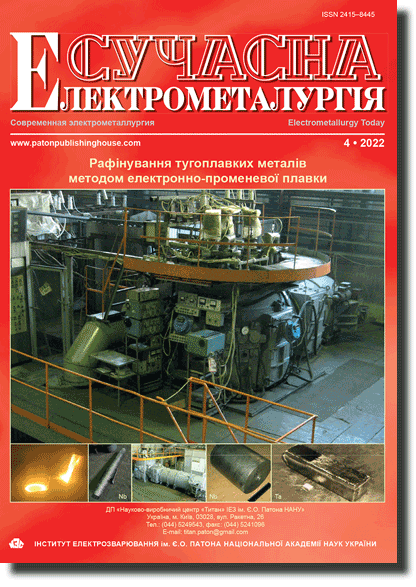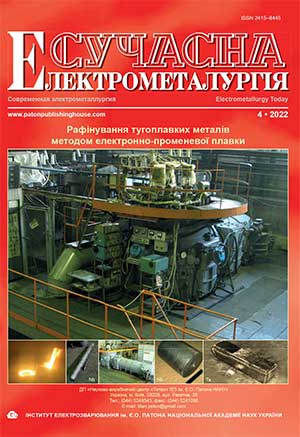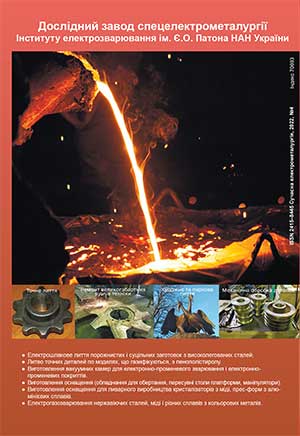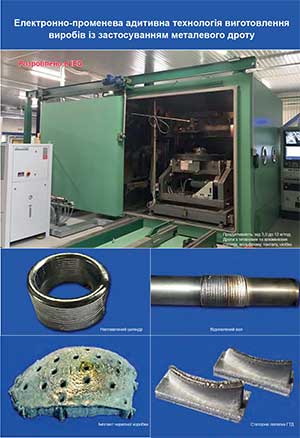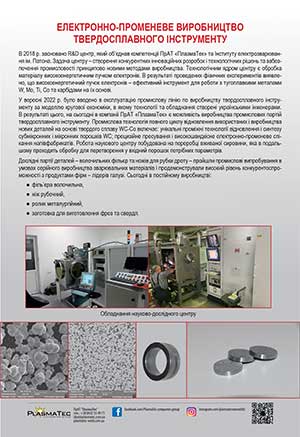| 2022 №04 (06) |
DOI of Article 10.37434/sem2022.04.07 |
2022 №04 (08) |
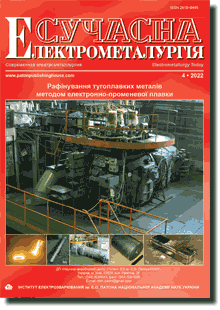
"Suchasna Elektrometallurgiya" (Electrometallurgy Today), 2022, #4, 43-48 pages
Structure and mechanical properties of high-temperature titanium alloy of Ti–Al–Zr–Si–Mo–Nb–Sn system after deformation treatment
S.V. Akhonin1, A.Yu. Severin1, O.M. Pikulin1, M.M. Kuzmenko2, L.D. Kulak2, O.M. Shevchenko2
1E.O. Paton Electric Welding Institute of the NAS of Ukraine. 11 Kazymyr Malevych Str., 03150, Kyiv, Ukraine. E-mail: office@paton.kiev.ua
2Frantsevych Institute for Problems of Materials Science of the NAS of Ukraine. 3 Acad. Krzhyzhanovskyi Str., 03142, Kyiv, Ukraine. E-mail: rapid@materials.kiev.ua
Abstract
The structure and mechanical properties of high-temperature titanium alloy of Ti–Al–Zr–Si–Mo–Nb–Sn system after hot deformation treatment by various modes were studied. It was found that metal deformation treatment performed in the upper part of the region of (α+β)-phase existence, ensures an increase of material ductility by almost 30 times, compared with lithium, and high strength values, both at room and at working temperature of 600 °С. Ref. 10, Tabl. 2, Fig. 5.
Keywords: high-temperature titanium alloy; electron beam melting; silicides; mechanical properties; ingot; chemical composition; deformation treatment; structure; phase
Received 06.09.2022
References
1. Paton, B.E., Trigub, N.P., Akhonin, S.B., Zhuk, G.V. (2006) Electron beam melting of titanium. Kyiv, Naukova Dumka [in Russian].2. Akhonin, S.V., Firstov, S.A., Severin, A.Yu. et al. (2019) Electron beam melting of heat-resistant titanium composites of Ti-Si-Al-Zr-Sn system. Suchasna Elektrometal., 2, 7−12 [in Ukrainian]. https://doi.org/10.15407/sem2019.02.02
3. Wu, T., Beaven, Р, Wagner, R. (1990) The Ti3(Al, Si)-Ti5(Si, Al)3 eutectic reaction in the Ti-Al-Si system. Scripta Metallurgica, 24, 207-212. https://doi.org/10.1016/0956-716X(90)90593-6
4. Shevchenko, O.M., Kulak, L.D., Kuzmenko, M.M., Firstov, S.O. (2020) Influence of zirconium alloying on structure and hardness of hardened cast biocompatible alloy Ti-18Nb- 1Si. Metalofizyka i Novitni Tekhnologii, 42(2), 237-249 [in Ukrainian]. https://doi.org/10.15407/mfint.42.02.0237
5. Firstov, S.O., Kulak, L.D., Kuzmenko, M.M., Shevchenko, O.M. (2018) Alloys of Ti-Al-Zr-Si system for operation at high temperatures. Fiz.-Khimich. Mekhanika Materialiv, 54(6), 30-35 [in Ukrainian]. https://doi.org/10.1007/s11003-019-00264-5
6. Firstov, S.O., Kulak, L.D., Kuzmenko, M.M., Shevchenko, O.M. (2019) Alloys of the Ti-Al-Zr-Si system intended for operation at high temperatures. Materials Sci., 54(6), 783-788. https://doi.org/10.1007/s11003-019-00264-5
7. Akhonin, S.V., Berezos, V.O., Pikulin, O.M. et al. (2022) Producing high-temperature titanium alloys of Ti-Al-Zr-Si-Mo-Nb-Sn system by electron beam melting. Suchasna Elektrometal., 2, 3-9 [in Ukrainian]. https://doi.org/10.37434/tpwj2022.07.07
8. Solonina, O.P., Glazunov, S.G. (1976) Titanium alloys. Heat-resistant titanium alloys. Moscow, Metallurgiya [in Russian].
9. Iliin, A.A., Kolachev, B.A., Polkin, I.S. (2009) Titanium alloys. Composition, structure, properties: Refer. Book. Moscow, VILS-MATI [in Russian].
10. (2000) State diagrams of binary metal systems: Refer. Book,Vol. 3, Book 2. Moscow, Mashinostroenie [in Russian].
Advertising in this issue:
The cost of subscription/purchase order journals or individual articles
| Journal/Currency | Annual Set | 1 issue printed |
1 issue |
one article |
| TPWJ/USD | 384 $ | 32 $ | 26 $ | 13 $ |
| TPWJ/EUR | 348 € | 29 € | 24 € | 12 € |
| TPWJ/UAH | 7200 UAH | 600 UAH | 600 UAH | 280 UAH |
| AS/UAH | 1800 UAH | 300 UAH | 300 UAH | 150 UAH |
| AS/USD | 192 $ | 32 $ | 26 $ | 13 $ |
| AS/EUR | 180 € | 30 € | 25 € | 12 € |
| SEM/UAH | 1200 UAH | 300 UAH | 300 UAH | 150 UAH |
| SEM/USD | 128 $ | 32 $ | 26 $ | 13 $ |
| SEM/EUR | 120 € | 30 € | 25 € | 12 € |
| TDNK/UAH | 1200 UAH | 300 UAH | 300 UAH | 150 UAH |
| TDNK/USD | 128 $ | 32 $ | 26 $ | 13 $ |
| TDNK/EUR | 120 € | 30 € | 25 € | 15 € |
AS = «Automatic Welding» - 6 issues per year;
TPWJ = «PATON WELDING JOURNAL» - 12 issues per year;
SEM = «Electrometallurgy Today» - 4 issues per year;
TDNK = «Technical Diagnostics and Non-Destructive Testing» - 4 issues per year.





